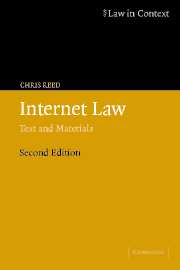Book contents
- Frontmatter
- Contents
- Preface
- Table of UK Statues
- Table of statutes–foreign jurisdictions
- Table of European Communities legislation
- Table of Conventions and Agreements
- Table of cases
- Introduction
- 1 The Internet as a distributed environment
- 2 From each according to his ability : actors and activities in the Internet world
- 3 An infinity of scarce resources : ownership and use of Internet resources
- 4 New actors on a new stage : intermediary liability in the Internet world
- 5 On the Internet, nobody knows you're a dog: identity and identification
- 6 Old wine in new bottles : traditional transactions in the Internet environment
- 7 The long arm of the law : cross-border law and jurisdiction
- 8 Legislative and regulatory arbitrage
- 9 Enforceability in the Internet environment
- 10 Facing the legislative and regulatory challenge
- Index
1 - The Internet as a distributed environment
Published online by Cambridge University Press: 05 June 2012
- Frontmatter
- Contents
- Preface
- Table of UK Statues
- Table of statutes–foreign jurisdictions
- Table of European Communities legislation
- Table of Conventions and Agreements
- Table of cases
- Introduction
- 1 The Internet as a distributed environment
- 2 From each according to his ability : actors and activities in the Internet world
- 3 An infinity of scarce resources : ownership and use of Internet resources
- 4 New actors on a new stage : intermediary liability in the Internet world
- 5 On the Internet, nobody knows you're a dog: identity and identification
- 6 Old wine in new bottles : traditional transactions in the Internet environment
- 7 The long arm of the law : cross-border law and jurisdiction
- 8 Legislative and regulatory arbitrage
- 9 Enforceability in the Internet environment
- 10 Facing the legislative and regulatory challenge
- Index
Summary
Introduction
One of the great dangers when examining a technical subject is misuse of the collective noun. For example, for many years some biologists argued that evolution worked, in part at least, through natural selection at the level of the species. ‘Species’, however, is a collective noun for the whole set of individual members of that species, and it is now clear that the evolutionary mechanism works only at the level of individual species members, or even at the lower level of the individual genes which have determined that individual's characteristics. For the purposes of evolutionary study, treating a species as a discrete entity is simply incorrect.
The word ‘Internet’ is, perhaps surprisingly, also a collective noun. This fact is obscured because we tend to speak of ‘the’ Internet; as a result it is very difficult not to think of it as a single entity. For the purposes of legal analysis, however, this single entity perspective is almost always misleading. It leads to a number of assumptions, all of which are false:
that there is a recognisable controller of the Internet, who might ultimately be responsible for it;
that the Internet has a fixed, definable infrastructure; and
that the information and services obtainable via the Internet are provided by that entity called ‘the Internet’.
- Type
- Chapter
- Information
- Internet LawText and Materials, pp. 7 - 23Publisher: Cambridge University PressPrint publication year: 2004
- 1
- Cited by

